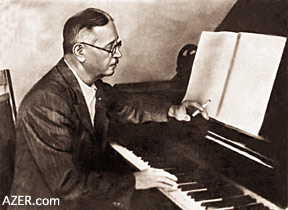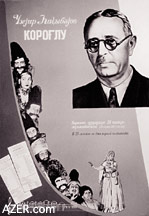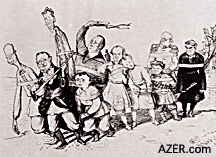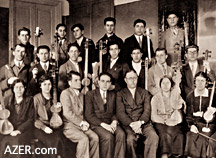|

Spring 2005 (13.1)
Pages
80-81
Soviet Music and Society
Under Lenin and Stalin: The Baton and the Sickle
by
Matt O'Brien
  What
role did music play in Soviet society during the eras of Lenin
and Stalin (1920s-1950s)? That's the issue examined in the book,
"Soviet Music and Society Under Lenin and Stalin: The Baton
and the Sickle", edited by Neil Edmunds (Routledge Curzon,
2004. List Price $100). What
role did music play in Soviet society during the eras of Lenin
and Stalin (1920s-1950s)? That's the issue examined in the book,
"Soviet Music and Society Under Lenin and Stalin: The Baton
and the Sickle", edited by Neil Edmunds (Routledge Curzon,
2004. List Price $100).
The book examines the various strategies adopted by composers
and musicians in their attempts to carve out careers in a rapidly
evolving society. It discusses the role of music in Soviet society
and people's lives, showing how political ideology proved to
be both an inspiration as well as an inhibiting force.
The book explores how music and politics interacted in the lives
of two of the 20th century's greatest composers - Shostakovich
and Prokofiev - and also the lives of lesser well-known Soviet
composers including Azerbaijan's beloved Uzeyir Hajibeyov (1885-1948)
The book consists of 11 chapters written by various contributors.
Attention is given to music of certain regions, such as Armenia,
Karelia (near Finland) and Kazakhstan. Some chapters deal with
more general themes such as Russian folk music in the 1930s,
or the propagandistic uses of music, particularly in the 1920s.
Gerard McBurney, a well-known musicologist and composer who has
reconstructed some of Shostakovich's more fragmentary music scores,
discusses Shostakovich's works. Prokofiev's ballet "Le Pas
d'Acier" is also examined. Only one chapter in the book
is dedicated entirely to the life of a single composer. This
is the chapter written by Matthew O'Brien about Uzeyir Hajibeyov
(1885-1948).
  Left: Azerbaijani composer
Uzeyir Hajibeyov (1884-1948) featured in book entitled "Soviet
Music and Society Under Lenin and Stalin: The Baton and the Sickle"
by Neil Edmunds. Left: Azerbaijani composer
Uzeyir Hajibeyov (1884-1948) featured in book entitled "Soviet
Music and Society Under Lenin and Stalin: The Baton and the Sickle"
by Neil Edmunds.
It was early
2002 when O'Brien was first approached to contribute a chapter
to this anthology. He initially had planned to write about Nikolai
Myaskovsky, a Russian composer whom he feels is very underrated.
O'Brien began his research but at some point quite early on,
he chanced upon HAJIBEYOV.com, a Web site created by Azerbaijan
International magazine which features the life and work of Uzeyir
Hajibeyov.
O'Brien ordered Hajibeyov's music (the 6 CD set of Classical
Music of Azerbaijan and the 7 CD set of Uzeyir Hajibeyov) at
AZER.com. The only work by Hajibeyov that O'Brien had ever heard
prior to this was the Soviet Azerbaijan National Anthem, which
he had discovered on an old Melodiya LP.
There were a number of factors that attracted Matthew to write
about Hajibeyov. He explains his decision like this: "First
of all, Hajibeyov's music itself is great. I've always been fascinated
by the exotic Eastern hints that can be heard in some Russian
compositions, but Hajibeyov's music was different. His was a
genuine attempt to find a synthesis between eastern and western
music. It wasn't just a European composition given some fancy
Oriental dressing. Hajibeyov's music was different. Whatever
anyone may think about the musical and compositional merits of
his first mugham opera, 'Leyli and Majnun', in my opinion, it
is one of the most progressive and experimental pieces of music
written at that time - more so even than controversial works,
such as Stravinsky's 'Rite of Spring."
  Left:
Program
from Koroghlu opera performed in Moscow in 1938. Left:
Program
from Koroghlu opera performed in Moscow in 1938.
But in addition
to the music, O'Brien was fascinated by Hajibeyov as a human
being. O'Brien writes: "The material posted on the HAJIBEYOV.com
Web site enables the reader to 'get to know' the composer in
a way which is very rare except for big name composers. However,
this information has no ulterior motivation forced upon you as,
for example, most literature related to Shostakovich. So for
me, another incredibly important factor was the greatness of
this man as a human being.
"There are many composers whose music I cherish and many
whom I wish I could have met, but there are few who can be described
as being as great a human being as their music. The testimonies
about Uzeyir Hajibeyov all confirm this. His kindness stands
out, as does his progressive and liberal attitude towards women
(especially for his time and background). His importance is much
more than just as a composer."
The book will appeal to specialists in Soviet music history,
those interested in 20th century music in general, as well as
students of the history, culture and politics of the Soviet Union.
Below: Azerbaijan's First
Orchestra of Traditional instruments with Notes, meaning that
prior to this time, these instruments were played exclusively
from memory and improvisation. Hajibeyov led the movement to
learn to play composed music from reading notes. He is seated
in the front row, wearing glasses. Composer Said Rustamov is
left of Hajibeyov. Haji Khanmammadov, the first person to compose
concerts for tar, kamancha and harp, is on th second row, third
from left.
 |
 |
______
Matt O'Brien lives in Harrogate, North Yorkshire, UK. Researching
and writing about Hajibeyov kindled a deep interest and love
for Azerbaijani music. Since then, Matt has gone on to compile
a "Dictionary of Azerbaijani Composers". Azerbaijan
International's staff is assisting O'Brien by meeting with Azerbaijani
composers, collecting photos and checking the accuracy of the
list and making sure that their newest works are also included.
Contact Matthew O'Brien at ai@artnet.net.
Back to Index AI 13.1 (Spring
2005)
AI Home
| Search | Magazine
Choice
| Topics
| AI Store | Contact us
Other Web sites
created by Azerbaijan International
AZgallery.org | AZERI.org | HAJIBEYOV.com
|





